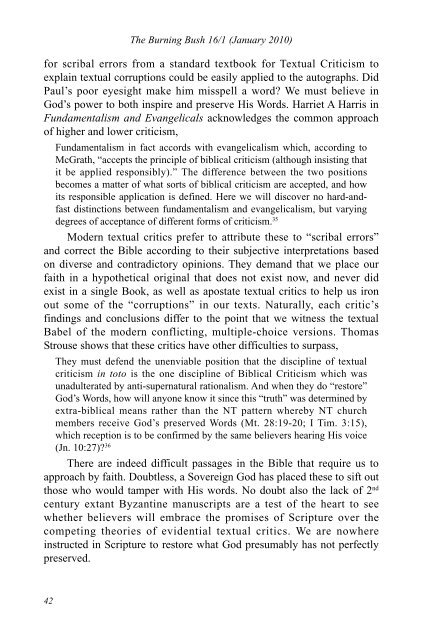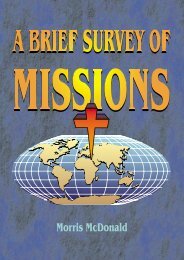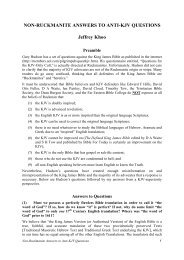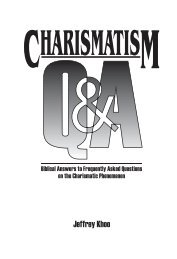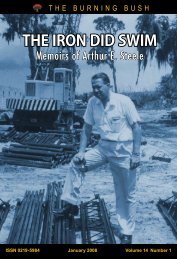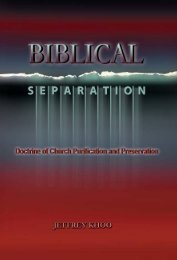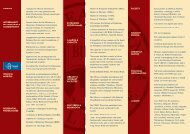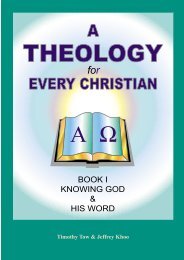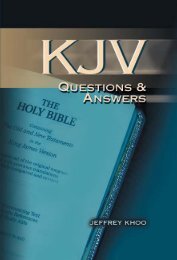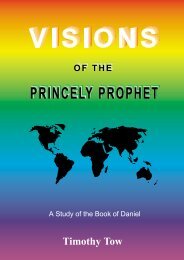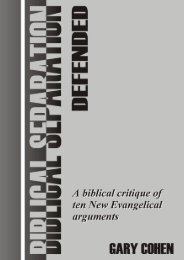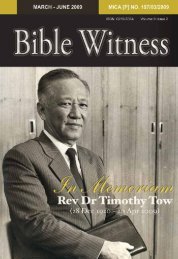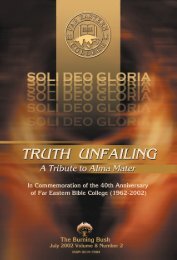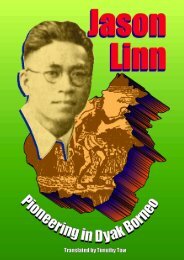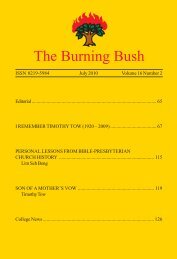The Burning Bush - Far Eastern Bible College
The Burning Bush - Far Eastern Bible College
The Burning Bush - Far Eastern Bible College
Create successful ePaper yourself
Turn your PDF publications into a flip-book with our unique Google optimized e-Paper software.
<strong>The</strong> <strong>Burning</strong> <strong>Bush</strong> 16/1 (January 2010)for scribal errors from a standard textbook for Textual Criticism toexplain textual corruptions could be easily applied to the autographs. DidPaul’s poor eyesight make him misspell a word? We must believe inGod’s power to both inspire and preserve His Words. Harriet A Harris inFundamentalism and Evangelicals acknowledges the common approachof higher and lower criticism,Fundamentalism in fact accords with evangelicalism which, according toMcGrath, “accepts the principle of biblical criticism (although insisting thatit be applied responsibly).” <strong>The</strong> difference between the two positionsbecomes a matter of what sorts of biblical criticism are accepted, and howits responsible application is defined. Here we will discover no hard-andfastdistinctions between fundamentalism and evangelicalism, but varyingdegrees of acceptance of different forms of criticism. 35Modern textual critics prefer to attribute these to “scribal errors”and correct the <strong>Bible</strong> according to their subjective interpretations basedon diverse and contradictory opinions. <strong>The</strong>y demand that we place ourfaith in a hypothetical original that does not exist now, and never didexist in a single Book, as well as apostate textual critics to help us ironout some of the “corruptions” in our texts. Naturally, each critic’sfindings and conclusions differ to the point that we witness the textualBabel of the modern conflicting, multiple-choice versions. ThomasStrouse shows that these critics have other difficulties to surpass,<strong>The</strong>y must defend the unenviable position that the discipline of textualcriticism in toto is the one discipline of Biblical Criticism which wasunadulterated by anti-supernatural rationalism. And when they do “restore”God’s Words, how will anyone know it since this “truth” was determined byextra-biblical means rather than the NT pattern whereby NT churchmembers receive God’s preserved Words (Mt. 28:19-20; I Tim. 3:15),which reception is to be confirmed by the same believers hearing His voice(Jn. 10:27)? 36<strong>The</strong>re are indeed difficult passages in the <strong>Bible</strong> that require us toapproach by faith. Doubtless, a Sovereign God has placed these to sift outthose who would tamper with His words. No doubt also the lack of 2 ndcentury extant Byzantine manuscripts are a test of the heart to seewhether believers will embrace the promises of Scripture over thecompeting theories of evidential textual critics. We are nowhereinstructed in Scripture to restore what God presumably has not perfectlypreserved.42


